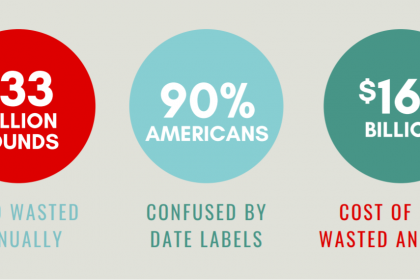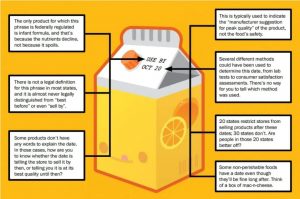
When in doubt, throw it out? Smell check? Taste test? Eyeball it? Food date labels have become so confusing that many consumers use their own sensory check to decode food expiration dates.
The food industry noticed. “Use By” dates are becoming uniform, with nine in 10 grocery store products now printing consumer-friendly labels. By 2020, all products will carry a simplified date. The 10 date-label categories will pair down to two – “Best if Used By” and “Use By.”
From Farm to Trash
Critical to food product relabeling is curbing massive amounts of food waste. A study by Harvard Law School’s Food Law and Policy Clinic and the Natural Resources Defense Council found more than 90 percent of Americans are throwing away food before it goes bad because they misinterpret the food label.
“Expiration dates are in need of some serious myth-busting because they’re leading us to waste money and throw out perfectly good food, along with all of the resources that went into growing it,” said Dana Gunders, NRDC staff scientist. “Phrases like ‘sell by,’ ‘use by,’ and ‘best before’ are poorly regulated, misinterpreted and leading to a false confidence in food safety. It is time for a well-intended but wildly ineffective food date labeling system to get a makeover.”
Over 40 percent of the American food supply doesn’t even make it to a plate. That amounts to $165 billion worth of food that’s thrown away annually. Food waste has become the single largest contributor of solid waste in U.S. landfills. The USDA and EPA set the first national food waste reduction goal in 2015: 50 percent less food waste by 2030.
Industry Move
The product labeling initiative was launched in 2017 by the two largest grocery trade groups – the Grocery Manufacturers Association and the Food Marketing Institute. Geoff Freeman, GMA president and CEO, called it a “proactive solution to give American families the confidence and trust they deserve in the goods they buy.”
The standardized labels are not mandatory. They are voluntary.
The USDA Food Inspection and Safety Service made the recommendation in 2016 for food manufacturers to to apply “Best if Used By” to product label. But the industrywide label standardization is not government mandated.
“Virtually every discussion included concerns regarding waste generated as a result of consumer confusion about the various date labels on foods and what they mean,” said Mike Conaway, R-Texas, the House Agriculture Committee Chairman. “I am pleased to see the grocery manufacturing and retail industries tackling this issue head on. Not every issue warrants a legislative fix, and I think this industry-led, voluntary approach to standardizing date labels is a prime example.”
Dozens of consumer packaged goods brands and retail companies voted unanimously to change expiration dates exclusively to “Use By” by January 2020. Major brands like Walmart, Campbell, Kellogg and Nestle all spearheaded the change.
The 2020 date was set to give companies time to change dates on their packaging. It also coincides with the release of the new FDA nutrition facts panel.
Simplified Labels
The old labels – which included options like “Sell By” and “Display Until” – left consumers in a guessing game. Most products don’t include an explanation of the date, like whether it’s a descriptive feature for the store or the consumer. Even grocery store workers were confused. Employees were polled and reported they, too, cannot distinguish dates on food labels.
The new labels mean:
- “Best If Used By” – quality designation. This is the date the food manufacturer thinks the product should be consumed for peak flavor.
- “Use By” – safety designation. Perishable food is no longer food after this date.
Legal Change on Horizon
Is a government mandate likely?
Currently, the only product federally regulated for expiration dates is infant formula. There is no legal definition for food expiration dates in most states. And state food labeling standards vary widely – 20 states restrict stores from selling products after the expiration date, while 30 states don’t enforce such a rule.
The Food Date Labeling Act was introduced to Congress in 2016, but no further action has happened. The act would legally require food date standardization, and require the USDA and Department of Health and Human Services to educate consumers on date label meanings.
Interesting, the proposal also questions the subjective nature of expiration dates. It states no one could “prohibit the sale, donation or use of a product after the quality date for the product has passed.”
